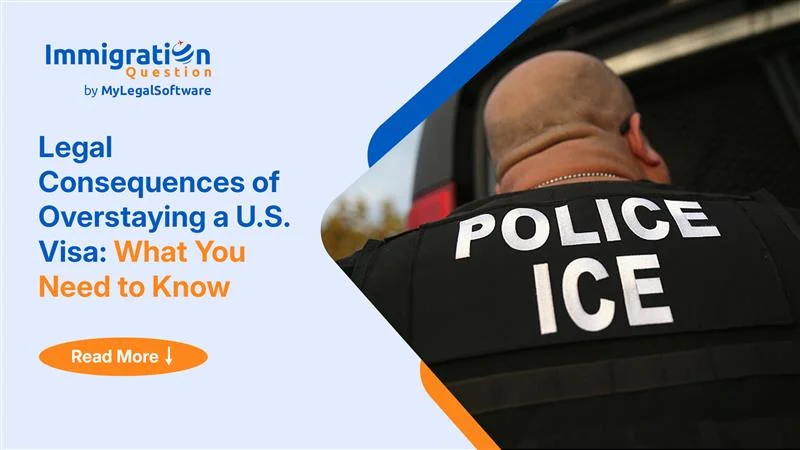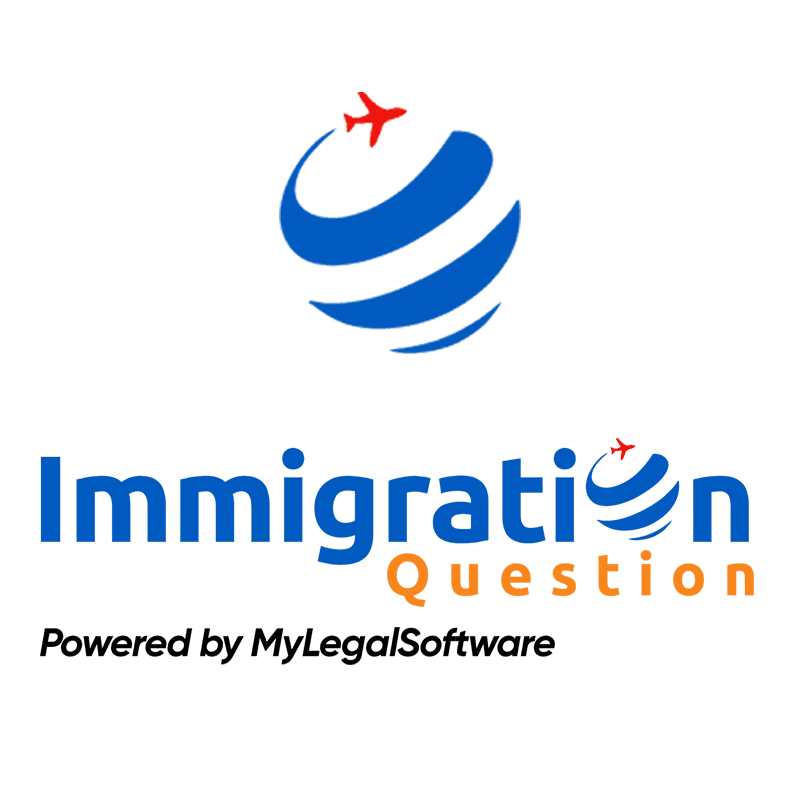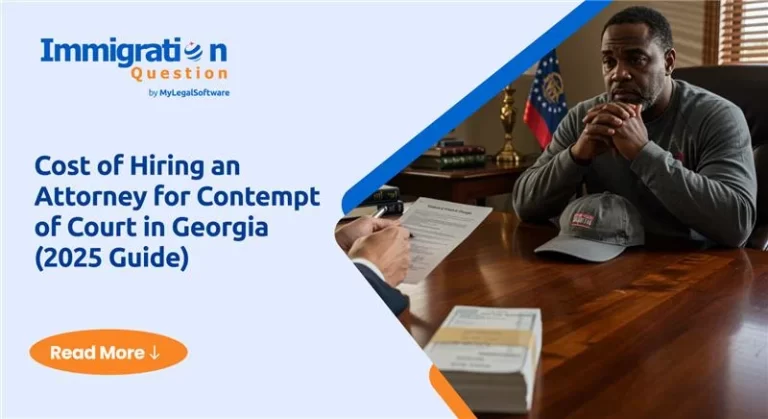Each year, thousands of people visit the United States on different types of visas—tourist, student, work, or exchange. But what happens if you stay longer than you’re legally allowed?
The consequences of overstaying a U.S. visa are far more serious than many travelers realize. It can lead to severe legal, immigration, and personal consequences. Whether you overstayed by a few days or several months, it can affect your chances of re-entering the U.S., obtaining a green card, or even adjusting your status.
In this post, we’ll break down the consequences of overstaying a U.S. visa, including long-term immigration penalties, re-entry bans, possible deportation, and what you can do if you’ve already overstayed. First let’s look at what it means to overstay a U.S. visa.
What Does It Mean to Overstay a Visa in the U.S.?
Overstaying your visa means you remained in the United States beyond your authorized period of stay, as indicated on your Form I-94 (Arrival/Departure Record)—not necessarily the date printed on your visa.
A visa only allows you to enter the U.S.; it does not determine how long you can stay. The length of your stay is determined by the Department of Homeland Security and recorded on the I-94. So even if your visa is valid for 10 years, your stay might be limited to 6 months.
If you remain after your I-94 expiration date, you are unlawfully present, and that’s where the problems begin.
What Are the Consequences of Overstaying a U.S. Visa?
The consequences of overstaying a U.S. visa depend heavily on how long you’ve remained in the country beyond your authorized stay and your individual immigration circumstances. U.S. immigration law takes overstays seriously, and the longer the overstay, the harsher the penalties. Below is a detailed breakdown:
If You Overstay Less Than 180 Days
If you overstay your visa for fewer than 180 days, you may be able to leave the United States voluntarily without facing an automatic bar on re-entry. However, even a short overstay is officially recorded by immigration authorities, and it can negatively impact your future visa applications. For example, you may be viewed as less trustworthy by consular officers, increasing the risk of denial when applying for future visas.
Additionally, during the overstay period, you’re no longer considered in legal status. This means you become ineligible to extend your visa, change your immigration status, or adjust your status to permanent residency while still in the U.S. In most cases, you must leave the country and apply from abroad if you hope to re-enter lawfully.
If You Overstay Between 180 Days and One Year
Once your overstay passes 180 days, the consequences become significantly more serious. If you voluntarily depart the U.S. after overstaying for this long, but before reaching one full year—you will face a 3-year re-entry bar. This means you are prohibited from returning to the United States for three years, unless you are granted a special waiver (such as through Form I-601 for extreme hardship).
This 3-year ban applies even if you leave the country voluntarily, and it can affect your eligibility for most U.S. visas and immigration programs in the near future. It’s especially problematic for individuals who have job offers, are engaged or married to U.S. citizens, or are hoping to continue their education or professional development in the States.
If You Overstay More Than One Year
If your overstay exceeds one full year, you will be subject to a 10-year bar from re-entering the United States. This is one of the most severe penalties for visa overstay and has long-term consequences on your immigration journey. Even if you qualify for a green card through a U.S. citizen spouse or employer, the 10-year bar can prevent you from adjusting status or returning through legal means unless you are approved for a waiver.
This level of overstay also significantly diminishes your chances of receiving immigration benefits in the future. You may be permanently ineligible for certain visas, face visa application denials, and could even be subject to removal proceedings if you’re apprehended by immigration authorities while still in the U.S.
Other Legal and Immigration Consequences
Beyond the well-known 3-year and 10-year re-entry bars, the consequences of overstaying a U.S. visa can ripple into many areas of your immigration journey. Overstaying—even for a short period—can trigger a range of legal and procedural setbacks that limit your options in the future. Below are four significant visa overstay penalties you may encounter.
1. Ineligibility for Visa Extensions or Adjustment of Status
Once you’ve overstayed your visa, you’re no longer considered in valid immigration status. This makes you ineligible to apply for a visa extension, change your status (e.g., from a tourist to a student), or adjust your status to permanent residency, unless you qualify for a rare exception or apply for a waiver.
For example, a person who overstays their temporary U.S. visa cannot simply file for a green card without first leaving the country or overcoming the unlawful presence bar. These restrictions apply across most categories, including family-based, employment-based, and student visa paths.
2. Deportation (Also Known as Removal Proceedings)
One of the more severe legal consequences of overstaying a visa is the possibility of deportation. Immigration and Customs Enforcement (ICE) can issue a Notice to Appear (NTA), requiring you to attend a hearing before an immigration judge.
If the judge finds that you have no valid reason to remain in the U.S., they may issue a removal order, which results in your deportation. A deportation record will not only make future visa approvals incredibly difficult, but may also impose long-term immigration bars, including the 10-year ban for unlawful presence.
3. Ban on Visa Reissuance or Automatic Visa Voiding
When you overstay your visa, any valid U.S. visa in your passport may be automatically voided under Section 222(g) of the Immigration and Nationality Act. This rule means that even if your visa hasn’t technically expired, it becomes null and unusable the moment you overstay your authorized period of stay.
To travel to the U.S. again, you’ll be required to apply for a new visa from your home country—not from a third country. This reapplication process is not guaranteed and carries a high risk of denial, especially for individuals who have already shown disregard for U.S. immigration laws.
4. Impact on Future Immigration Benefits and Applications
Perhaps the most serious consequence of overstaying a U.S. visa is how it harms your ability to access future immigration benefits. Even a short overstay can leave a negative mark on your immigration record that lasts for years. If you later marry a U.S. citizen or receive employment-based sponsorship, you may still be denied adjustment of status due to prior unlawful presence.
Applying for a waiver or pardon becomes more complex and uncertain, often requiring you to prove extreme hardship to a U.S. citizen relative. Overstaying also flags your record in the U.S. consular database, making future visa approvals—for tourism, study, or work—much more difficult. In many cases, your green card application could be delayed or permanently denied.
Whether you’re applying for a fiancé visa, student visa, or immigrant visa, an overstay can seriously set back your immigration goals and lead to years of legal hurdles or re-entry bans.
What Is the Waiver for Overstaying a U.S. Visa?
If you’ve overstayed your visa in the U.S. and now face a 3-year or 10-year re-entry bar, you may qualify for a waiver of inadmissibility—but only under certain conditions.
One option is Form I-601, which requires you to prove that your absence would cause extreme hardship to a U.S. citizen spouse or parent.
Another is Form I-212, which lets you seek permission to reapply for admission after being deported or removed.
These waivers are not guaranteed—they’re reviewed case-by-case, and approval depends on strong evidence. Because of the legal complexity, it’s best to consult an immigration attorney to improve your chances.
Can I Avoid Deportation After Overstaying My Visa?
Yes, in some cases, it’s possible to avoid deportation after a visa overstay, but your options are limited, highly case-specific, and often require legal support. Here are a few possible paths:
- Voluntary Departure
You may request to leave the U.S. voluntarily at your own expense before a formal removal order is issued. This can help you avoid the long-term penalties associated with deportation, such as re-entry bars or bans on visa eligibility. - Asylum or Humanitarian Relief
If you fear persecution in your home country due to race, religion, nationality, political opinion, or membership of a particular social group, you may be eligible to apply for asylum. Other humanitarian relief options like withholding of removal or protection under the Convention Against Torture may also apply in certain cases. - Adjustment Through Marriage
If you are married to a U.S. citizen, you may be able to adjust your status even after overstaying. However, this route is complicated by your unlawful presence and may require additional legal steps—like applying for a waiver, especially if you’ve triggered a re-entry bar.
Each of these options involves strict eligibility requirements and potential legal hurdles. It’s best to consult with an immigration attorney to assess which strategy best fits your situation.
Tips to Avoid or Correct Visa Overstay
Check Your I-94 Record Regularly at https://i94.cbp.dhs.gov
- Apply for extensions early—ideally 45 days before expiration.
- Leave before your status expires if you’re not planning to apply for an extension.
- Keep copies of your I-94 and immigration documents.
- Consult a licensed immigration lawyer if your status is at risk.
Frequently Asked Questions
1. What happens if I overstay my visa in the USA?
You may be barred from re-entering the U.S. for 3 or 10 years, become ineligible for immigration benefits, and face removal proceedings.
2. Can I get a green card if I overstayed my visa?
It depends on your situation. Marriage to a U.S. citizen or qualifying for certain waivers might allow it, but legal help is essential.
3. Is there a waiver for overstaying a U.S. visa?
Yes, through Form I-601 or Form I-212, depending on the circumstances. These are complex and require legal expertise.
4. What are the penalties for overstaying a student visa?
You lose F-1 status, may become ineligible for OPT/CPT, and face long-term bars or visa denials.
Conclusion
Overstaying your visa in the U.S. might seem harmless, especially if you’re only a few days late, but the legal consequences of overstaying a U.S. visa can be serious and long-lasting. From bans on re-entry to disqualification from immigration benefits, it’s not a risk worth taking.
If you’ve already overstayed, don’t panic, but act fast, get legal help, and understand your options. The earlier you address your situation, the better your chances of minimizing penalties and protecting your future immigration opportunities.
Unsure of what to do after overstaying your visa?
Get personalized legal advice from trusted immigration attorneys. Book your free consultation today and take the first step toward a solution.




![Top 5 Immigration Questions People Asked Online This Week [June 13, 2025]](https://blog.immigrationquestion.com/wp-content/uploads/2025/06/top-5-immigration-questions-people-asked-online-this-week-june-13-2025-768x419.webp)




